Tuesday, December 7
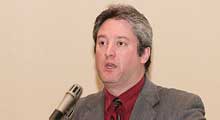 Tim Myers
Tim Myers
8:30 am – 9:20 am
AARC Annual Business Meeting
Timothy R Myers RRT-NPS FAARC, AARC President/Presiding
The official Annual Business Meeting of your professional association. The 2011 AARC Officers, Board of Directors and House of Delegates officers are installed. Reports from the AARC leadership are presented. The meeting concludes with the address of the 2011–2012 President, Karen J Stewart MS RRT FAARC.
9:30 am – 10:20 am
37th Donald F Egan Scientific Memorial Lecture
This lecture provides an overview of in-depth information about dynamic aspects of pulmonary physiology, pulmonary medicine, or clinical respiratory care. The lectureship is extended to a recognized world-class participant in the area of interest—investigator, clinician or academician.
The Mechanical Ventilator—Past, Present, and Future
Robert M Kacmarek PhD RRT FAARC, Boston MA
The continuing development of the mechanical ventilator has helped to define the profession of respiratory care. In the beginning ventilators were simple in design, today they are highly complex and sophisticated microprocessors capable of providing multiple modes of ventilatory support. However, the question that must be addressed is: What should be the capabilities of future mechanical ventilators? In this presentation the rationale for the historical refinements of the mechanical ventilator will be discussed and the needed changes to future generations of mechanical ventilators will be outlined.
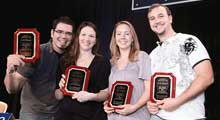 Sputum Bowl Contestants
Sputum Bowl Contestants
8:00 am – 6:00 pm
Sputum Bowl Preliminaries
Deborah J Hendrickson RRT, Madison WI/Presiding
Supported by an unrestricted educational grant from
![]()
Teams from the AARC state affiliates compete in the preliminary competitions. The top four teams will advance to the Finals on Wednesday evening, Dec. 8, along with the Student Sputum Bowl finalists.
10:30 am – 11:10 am
Patient Safety, Resource Management, and Essentials of Communication: A Perspective from the Bedside to the VP’s Desk
Michael R Anderson MD, Cleveland OH
Few clinicians are able to provide a comprehensive perspective on patient safety, resource management, and essentials of communication from the bedside to the hierarchy of hospital administration. Dr. Anderson will provide a broad base of valuable information for the bedside clinician to improve understanding of the medical system and to learn valuable information to improve the bedside care of our patients.
10:30 am – 11:10 am
The AARC CPGs
Ruben D Restrepo MD RRT, San Antonio TX
This presentation will update the activities of the AARC Clinical Practice Guidelines Committee, with particular attention to the CPGs published in 2010.
 Holiday Decorations at Bellagio
Holiday Decorations at Bellagio
10:30 am – 11:10 am
Interfacing Respiratory Care Information Systems with Computerized Physician Order Entry (CPOE)
George W Gaebler MS Ed RRT FAARC, Syracuse NY
The speaker will present the reasons, justification for, and outcomes that are realized from the creation of a fully interfaced RCIS with CPOE. The presenter will cover planning, system build, and pitfalls to be avoided when trying to interface a RCIS with hospital mainframe systems.
10:30 am – 11:10 am
Proving the Value of RTs—Inpatient Screening Program for Obstructive Sleep Apnea
Joy E Hargett RRT, Houston TX
This presentation will discuss the development and implementation of an inpatient OSA screening program in a large, metropolitan hospital. The presenter will discuss her experience with identifying and screening high-risk patients and will explain how the program has enhanced sleep lab referrals resulting in revenue stream enhancement.
10:30 am – 11:30 am
Professor’s Rounds: Therapeutic Application of One-Lung Ventilation
Professor: Charles G Durbin Jr. MD FAARC, Charlottesville VA Presenter: Randal S Blank MD PhD, Charlottesville VA
Patients with unilateral lung disorders present unique challenges for their caregivers. During this presentation, treatment of a patient with alveolar proteinosis undergoing brochoalveolar lavage will be discussed. Techniques of lung isolation, problems with oxygenation, and issues related to mechanical ventilation will be discussed. This case will be used to develop an approach management of other situations that may benefit from single lung ventilation such as bronchopleural fistula, unilateral ARDS, and lung transplantation.
 Luxor Las Vegas
Luxor Las Vegas
10:30 am – 11:45 am
Travel Challenges for Patients with Chronic Respiratory Disease
10:30 am – 11:05 am
Traveling with Oxygen
Joseph S Lewarski RRT FAARC, North Ridgeville OH
This presentation will provide an overview of current FAA regulations for using personal oxygen equipment inflight and will review the important pre-travel arrangements oxygen patients must make to ensure TSA clearance, prompt boarding and a safe air travel experience.
11:10 am – 11:45 am
Traveling with Ventilatory Support
Lisa Wolfe MD, Chicago IL
This presentation will provide details of the challenges faced by patients and their family/caregivers when traveling with ventilatory support, provide examples of patients who have successfully traveled with their ventilatory support devices, and offer helpful hints to ensure a safe travel experience.
10:30 am – 11:55 am
Clinical Neonatal-Pediatric Cases: An Interactive Approach
Stacey Peterson-Carmichael MD, Durham NC and Robert M DiBlasi RRT-NPS, Seattle WA
Ever wonder how your diagnostic and management styles and decisions compare with those of your peers? In this interactive audience response session, interesting neonatal and pediatric cases will be presented from the physician and RT perspectives. Come learn and share your opinions with the presenters and your colleagues.
 Open-Top Bus Tour
Open-Top Bus Tour
10:45 am – 11:30 am
Hot Topics in Pediatrics and Transport
Cardiopulmonary Implications in the Morbidly Obese Pediatric Patient with Acute Respiratory Failure
Jerome Spinnato RRT-NPS, Pittsburgh PA
The current trend of obesity in the Unites States, particularly in children, represents a challenge to pediatric hospitals, interfaculty transport teams and outlying hospitals. Anticipation and effective management of potential complications is critical to achieving successful outcomes. This lecture will focus on the unique anatomic and physiologic characteristics of obese children that complicate airway management, mechanical ventilation and cardiopulmonary response. A review of epidemiology and current literature pertaining to this population will be discussed. Additionally, this lecture will review pre-transport considerations for both outlying hospitals and interfaculty transport teams.
11:15 am – 11:55 am
Does the Arterial PCO2 Really Matter?
Ken Tegtmeyer MD, Cincinnati OH
Arterial blood gas analyses are frequently obtained for patient with acute lung injury. Many ventilator manipulations are made based on the PaCO2 value. But, does the PaCO2 really matter? This presentation will provide a thoughtful approach to the concept of permissive hypercapnia from the medical literature to the application at the bedside.
 Pirate Show at Treasure Island
Pirate Show at Treasure Island
11:15 am – 11:55 am
Hospital-acquired Infections: How Are We Doing?
Supported by an unrestricted educational grant from
![]()
Robert M Kacmarek PhD RRT FAARC, Boston MA
Hospital-acquired infections significantly influence health care costs, length of stay, morbidity and mortality. RTs play an influential role in the identification, treatment, and prevention of hospital-acquired infections. Strategies from simple to complex can have a direct effect on the outcome of your patient.
11:20 am – 12:00 noon
RT and the Recession: Leading Through Troubling Times
Douglas S Laher MBA RRT, Cleveland OH
Leadership is a staple, or should be, in every RT department. Some individuals are talented leaders while others are great managers, but not necessarily great leaders. During difficult economic times, it is incumbent upon managers to lead more effectively than ever. Attendees will leave this presentation armed with tangible action items that they can take back to the office to make immediate changes in their dealings with employees.
11:20 am – 12:00 noon
The Ethics of Using Non-invasive Ventilation at the End of Life
Shawna L Strickland PhD MEd RRT-NPS AE-C, Columbia MO
This presentation will address the ethical issues associated with using non-invasive ventilation to sustain life in futile situations. There are situations in which the RT faces ethical dilemmas as they strive to provide the most ethical patient care, although the patient has completed a “do not attempt resuscitation” or “do not intubate” order. The presentation will view the situation from all perspectives and review current literature regarding attitudes about using non-invasive ventilation at the end of life.
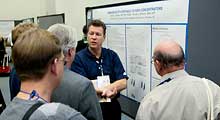 Open Forum
Open Forum
12:30 pm – 2:25 pm
OPEN FORUMs #5—Home Care; Sleep; Rehab; O2 Therapy
OPEN FORUMs #6—Education, Part 1
Clinicians present the results of their scientific studies. Abstracts with a similar focus are clustered into a symposium to encourage discussions and interactions among investigators and observers; posters expand the information presented. See abstract titles and authors.
1:00 pm – 1:45 pm
The AARC Leadership Institute: Preparing Tomorrow’s Leaders Today
Toni L Rodriguez EdD RRT, Phoenix AZ and
Linda I Van Scoder EdD RRT FAARC, Indianapolis IN
Robert L Chatburn RRT-NPS FAARC, Cleveland OH
and Richard M Ford RRT FAARC, San Diego CA
The Leadership Institute program is comprised of a core curriculum that each participant must complete comprised of topics related to a basic skill set any practitioner would need to advance professionally (ie: communication, leadership, basic finance, computer skills etc). After completion of the core curriculum, individuals can complete any or all of 3 separate tracks: Management, Education and/or Research. Upon completion of the Core and a Track, the individual will be awarded a certificate of completion. The main goal of the Fast Track program is to make accessible to any RT anywhere the skills and mentorship required to advance as a professional in their work environment. The topics for the three tracks were chosen because they are key to the advancement of our profession, and the AARC is committed to growing our own future leaders.
1:00 pm – 1:45 pm
Agencies Updates
Timothy R Myers RRT-NPS—AARC President
Michael T Amato—ARCF Chair
David L Bowton MD—CoARC Chair
Gregg L Ruppel RRT RPFT FAARC—NBRC President
The leadership of the AARC, ARCF, CoARC and NBRC will present the most updated information affecting the profession, research, accreditation, and credentialing. A must-attend session in your agenda!
1:00 pm – 1:45 pm
The Respiratory Therapist as a Clinical Research Coordinator: A Non-Traditional Role
Jan D Fernandez CCRC RRT-NPS, Atlanta GA
This presentation gives a brief historical overview of research as well as how and why it has changed over the years. The role of a clinical research coordinator is defined. The presentation also describes how a respiratory therapist is a perfect match for this type of non-traditional role. The presenter will also present some examples of the research that she is coordinating.
 Mardi Gras Show at Rio
Mardi Gras Show at Rio
1:00 pm – 3:35 pm
Monitoring of the Mechanically Ventilated Child
1:00 pm – 1:35 pm
Lung Volume Measurements—Is the Holy Grail Really on the Horizon?
John H Arnold MD, Boston MA
The titrate to the ideal PEEP remains an active clinical controversy. However, if lung volumes cannot be accurately determined, then how can PEEP really be optimally set? This presentation will review new strategies and technologies to accurately assess lung volume for mechanically ventilated patients.
1:40 pm – 2:15 pm
Airway Graphic Analysis: A Lost Art?
Ken Tegtmeyer MD, Cincinnati OH
Most modern-day ventilators continuously display airway graphics. But do you routinely analyze airway graphics in the care of your ventilated patients? Come learn about various strategies and technologies to accurately assess lung volume for mechanically ventilated patients.
2:20 pm – 2:55 pm
Capnography—Really the 5th Vital Sign
Michael A Gentile RRT FAARC, Durham NC
The data are mounting that capnography is underutilized in our ICUs. Should capnography be the 5th vital sign? Should all mechanically ventilated patients be monitored with capnography? These questions and others will be discussed based on the available medical literature.
3:00 pm – 3:35 pm
Pulmonary Function Testing—How, When, and Why
Stacey Peterson-Carmichael MD, Durham NC
Pulmonary function testing for extubated patients is routine, but what about mechanically ventilated children? This presentation will review the indications, techniques, and benefits of assessing the pulmonary function of intubated pediatric patients.
 The Volcano at The Mirage
The Volcano at The Mirage
1:00 pm – 3:50 pm
Continuing Care for Patients with Diseases Affecting Ventilation
1:00 pm – 1:30 pm
Overview of Neuromuscular Disease Affecting Ventilation
Lisa F Wolfe MD, Chicago IL
The presenter will discuss the etiology and pathology of neuromuscular diseases having an adverse impact on ventilation and gas exchange and will describe the pathophysiology that must be addressed in this patient population.
1:35 pm – 2:05 pm
Challenges of Providing Ventilatory Support for Neuromuscular Patients
Joshua O Benditt MD, Seattle WA
This presenter will describe the role of the RT in managing a patient with respiratory impairment secondary to a neuromuscular disease in the post-acute care setting, and will discuss the special challenges this patient population presents to the clinician.
2:10 pm – 2:40 pm
Options for Secretion Management in Neuromuscular Disease Patients
Louis Boitano MSc RRT, Seattle WA
This presentation will provide an overview of the challenges of maintaining effective secretion management for neuromuscular patients with impaired cough and/or artificial airway, and will discuss the role(s) of family caregivers in this essential undertaking.
2:45 pm – 3:15 pm
Special Challenges in Pediatric Patients with Neuromuscular Disease
Denise Willis RRT-NPS, Little Rock AR
The presenter will describe the special considerations in maintaining effective ventilation and secretion management in children afflicted with a neuromuscular disease and will present examples of programs that allow this special patient population to effectively participate in activities of daily living.
3:20 pm – 3:50 pm
Tips of the Trade: Optimizing Non-invasive Ventilation for Chronic Neuromuscular Disease
Louis Boitano MSc RRT
This presentation will share experiences and outcomes with the use of non-invasive techniques to maintain effective ventilation across the spectrum of activities of daily living in patients with neuromuscular disease, and will provide examples of how various challenges can be addressed without compromising patient safety.
 Emeril’s at MGM
Emeril’s at MGM
1:00 pm – 4:55 pm
AARC’s 26th New Horizons in Respiratory Care Symposium: ARDS Update
1:00 pm – 1:35 pm
What Is ARDS?
Jesus Villar MD PhD, Canary Islands Spain
How is ARDS defined? What are some of the practical problems with the current definitions? Is there a difference between clinical definitions used to enroll subjects into clinical trials?
1:40 pm – 2:15 pm
Is ARDS Preventable?
Ognjen Gajic MD, Rochester MN
Accumulating evidence suggest that many cases of ARDS are preventable. What are the roles of tidal volume limitation, PEEP, limiting transfusions, conservative fluid balance, etc, on the prevention of ARDS?
2:20 pm – 2:55 pm
Conventional Ventilator Management of ARDS
Dean R Hess PhD RRT, Boston MA
What tidal volume should be used? How should PEEP be set? Should volume-targeted or pressure-triggered modes be used?
3:00 pm – 3:35 pm
Approaches to Hypoxemia in Patients with ARDS
Randal S Blank MD PhD, Charlottesville VA
What is the evidence to support nonconventional ventilatory approaches such as recruitment maneuvers, APRV, HFOV, prone positioning, and inhaled vasodilators to improve oxygenation in ARDS?
3:40 pm – 4:15 pm
NIV for ARDS
Stefano Nava MD, Pavia Italy
NIV is standard care for COPD exacerbation and acute cardiogenic pulmonary edema. But does it have a role in ARDS? When, if ever, should it be used in this setting?
4:20 pm – 4:55 pm
Pediatric ARDS
Ira M Cheifetz MD FAARC, Durham NC
How does ARDS in children differ from that in adults? What is the evidence? What ventilator strategies should be used in pediatric ARDS?
 Holiday Decorations at The Palazzo
Holiday Decorations at The Palazzo
1:30 pm – 2:35 pm
Sleep Disorder Basics
1:30 pm – 2:00 pm
Sleep Apnea Therapy—Basics and Newer Types of Therapy
Paul A Selecky MD FAARC, Newport Beach CA
This session will first review the basics of positive airway pressure therapy including CPAP and bi-level PAP, and follow up with a discussion of some of the newer modalities of PAP available to patients and clinicians including ASV.
2:05 pm – 2:35 pm
Optimal PAP Adherence—What Does the Patient Need?
Joy E Hargett RRT, Houston TX
This session will discuss the challenges of ensuring patient compliance with prescribed PAP therapy. The speaker’s experience with measures for boosting optimal adherence to therapy will be described.
2:00 pm – 2:50 pm
The State of Polysomnography: Current Trends, Challenges, and Opportunities
Donna Arand PhD, Dayton OH
This presentation will provide an overview of the key trends impacting polysomnography today including economic factors, demographic shifts, and increased awareness of sleep disorders. Challenges facing the discipline will be discussed including education, training, recruitment and retention. Finally, the presenter will look to the future and project shifts likely to occur within the field over the next 5–10 years.
2:00 pm – 3:40 pm
Transitioning Care: Roles for RTs
2:00 pm – 2:30 pm
Identifying and Closing the Gaps in the Care of Patients with COPD
Brian W Carlin MD FAARC, Pittsburgh PA
The presenter will describe the known gaps in the care and management of patients with COPD ranging from the detection of COPD, through the management of a patient with an exacerbation, through the use of pulmonary rehabilitation as a component of such care.
2:35 pm – 3:05 pm
Competencies for the Respiratory Therapist Providing Home Care
Kim Wiles RRT, Ford City PA
The presenter will describe the competencies that are required for a respiratory therapist who provides home care. A program to impact the transition of care for a COPD patient from the hospital to the home environment based upon these competencies will be described.
3:10 pm – 3:40 pm
Innovative Transition of Care Partnerships for Hospitalized Patients Making the Transition from Acute Care to Home Care
Dan Easley, Ford City PA
The presenter will describe an innovative partnership for providing the transition of care for patients who are hospitalized with COPD to the home environment, with focus on customer satisfaction, quality of care, and seamless process of transition.
 Eiffel Tower at Paris Las Vegas
Eiffel Tower at Paris Las Vegas
2:00 pm – 4:55 pm
You and The Law
2:00 pm – 2:40 pm
Ethics, Adverse Events and the RT: Do I Have to Report That?
Thomas R Lamphere RRT, Sellersville PA
Health care workers and RTs in particular routinely face ethical questions and challenges every day. Obvious ethical questions including the removal of life support are frequently discussed. However, there are numerous other ethical questions and decisions that RTs are forced to make every day regardless of the health care venue in which they work.
2:45 pm – 3:25 pm
Risk Management and the Respiratory Therapist
Jonathan Fanaroff MD JD, Cleveland OH
Identify the role of respiratory therapy in risk management. Does multidisciplinary care affect the risk at the bedside? Who is really at risk at the bedside? Includes creating action plans and remedies when everything really does go wrong.
3:30 pm – 4:10 pm
Ten Things You Can Do to Avoid the Courtroom
Anthony L DeWitt JD RRT FAARC, Jefferson City MO
Anyone who has ever been served with lawsuit papers knows the sick feeling that goes through you when they arrive. Will everything be alright? Will my insurance protect me? But few of us on a daily basis do the 10 things we need to do to keep lawsuits at bay. This presentation will look at 10 simple steps you can take every day to ensure that you’re not sued, or that if you are, you will be able to prevail. At the conclusion of this presentation you will: (1) understand the value of personal relationships in lawsuit avoidance, (2) appreciate the value of the apology as a means of avoiding litigation, (3) understand the steps in documentation that help prevent lawsuits.
4:15 pm – 4:55 pm
Educator Academy: Legal Issues for RC Educators
Jonathan Fanaroff MD JD
Respiratory care program and clinical faculty are frequently faced with legal issues related to the student. These issues can entail such things as criminal background checks, confidentiality in the clinical setting, accessing patient records, to name a few. This presentation will provide an overview of these issues as they relate to ADA, HIPAA, FERPA, etc.
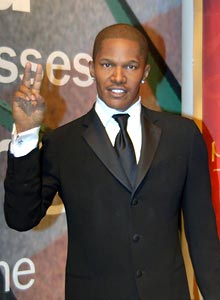 “Jamie Foxx” at Madam Tussaud’s Wax Musuem
“Jamie Foxx” at Madam Tussaud’s Wax Musuem
2:00 pm – 4:55 pm
Contemporary Topics in Programmatic Accreditation
2:00 pm – 2:40 pm
Models of Articulation: From Associate Degree to Baccalaureate Degree to Master’s Degree
Kathy Rye EdD RRT FAARC, Little Rock AR
Attendees will be provided with an overview of various models of articulation currently in use in our profession. General topics include programmatic and curriculum planning to ensure participation and collaboration by key individuals. Models used in other health care disciplines will also be discussed.
2:45 pm – 3:25 pm
Incorporating Inter-Rater Reliability into Your Curriculum
Kathy Rye EdD RRT FAARC
This presentation will cover the strategies needed for successfully incorporating inter-rater reliability methods into student evaluations. Emphasis will be placed on inter-rater reliability in the clinical setting as well as the steps necessary to comply with the new CoARC accreditation standards.
3:30 pm – 4:10 pm
The Annual Report Process: Strategies for Success
Stephen Mikles EdS RRT FAARC, Pinellas Park FL
Attendees will be provided with an overview of CoARC’s new Web-based annual reporting tool, E-Accreditation, which assists programs in their collection of annual program data and outcomes data. The presenter will focus on the process and strategies for successfully completing the annual report in time for the April 15, 2011 deadline.
4:15 pm – 4:55 pm
Don’t Sleep on It! Revising Your Polysomnography Program to Meet Current Standards
Thomas Smalling PhD RRT RPFT RPSGT FAARC, Bedford TX
Attendees will be provided with an overview of the new accreditation standards and its implications for programs offering the polysomnography program option. The presenter will focus on recent changes in accreditation of polysomnography programs and the strategies for implementing programmatic changes to address compliance with the new standards.
 Vegas Showgirls
Vegas Showgirls
2:45 pm – 4:10 pm
The Business of Sleep
2:45 pm – 3:25 pm
Opening a Sleep Laboratory—Making a Dream a Reality
Harold Davis RRT CPFT, Searcy AR
This presentation will discuss the market research that is vital when planning to open a sleep disorders laboratory. The presenter will share his experiences with the preparations required to successfully open and ensure continuing operation for this specialty business.
3:30 pm – 4:10 pm
Sleep Laboratory Accreditation
Harold Davis RRT CPFT
This presentation will review the preparation necessary to successfully complete the accreditation process for an Independent Diagnostic Testing Facility (IDTF). Attendees will receive tips on continuing compliance with accreditation standards.
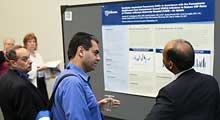 Open Forum
Open Forum
3:00 pm – 4:55 pm
OPEN FORUMs #7—Diagnostics
OPEN FORUMs #8—Airways Care
Clinicians present the results of their scientific studies. Abstracts with a similar focus are clustered into a symposium to encourage discussions and interactions among investigators and observers; posters expand the information presented. See abstract titles and authors.
3:45 pm – 4:55 pm
Does the Type of Manual Resuscitator Really Matter?
3:45 pm – 4:05 pm
Self Inflating vs. Non-self Inflating Bags: Is There Really a Difference?
John W Salyer RRT-NPS MBA, Seattle WA
The differences between the two most widely utilized manual resuscitators will be discussed. Advantages and disadvantages of each approach will be presented via a comprehensive review of the available medical literature.
4:10 pm – 4:30 pm
T-piece vs. Manual Inflating Bags: Is It Worth the Additional Expense?
Timothy R Myers RRT-NPS, Avon OH
This presentation will review the types of semi-manual resuscitators and then contrast them to the most widely used version of the manual ventilation—the ‘bag.’ Is the T-piece resuscitator superior to the more common approach?
4:35 pm – 4:55 pm
Should We Manually Resuscitate at All? Are We Doing More Harm Than Good?
Brian K Walsh MBA RRT-NPS FAARC, Dallas TX
Are we doing more harm than good with manual resuscitators? Should manual resuscitation be reserved only for dire situations? This presentation will review the myth that educated hands can provide a consistent airway pressure, minute ventilation, and assessment for changes in lung compliance.
 Studio 54 at MGM
Studio 54 at MGM
3:45 pm – 5:00 pm
Respiratory Home Care 2010 and Beyond
3:45 pm – 4:20 pm
Competitive Bidding and Other Regulatory Initiatives
Greg Spratt RRT CPFT, Philadelphia MO
This presentation will provide an update on the status of national competitive bidding and will review other regulatory initiatives that might impact respiratory home care.
4:25 pm – 5:00 pm
Impact of Reimbursement Changes on the Provision of Clinical Support Services and Possible Solutions
Louis M Kaufman RRT-NPS AE-C FAARC, Olney MD
This presentation will review how respiratory home care companies have been impacted by reimbursement changes and will discuss novel interventions that can be used to maintain needed clinical support when financial resources are challenged.
3:50 pm – 4:50 pm
Let’s Play the Game: An Exercise in Using Process Improvement Tools
Darnetta Clinkscale MBA RRT, St. Louis MO
Building on the information provided with regard to tools and techniques, the presenter will engage the audience using the Audience Response System (ARS) to engage the attendees in highly interactive exercises to demonstrate how to utilize these tools to decrease waste while maintaining quality.
4:00 pm – 4:40 pm
Management of the Difficult Pediatric Airway: Tricks of the Trade
John Arnold MD, Boston MA
What would you do if faced with a difficult airway? Can you identify a potential difficult airway? Does your ICU have the specialized equipment to manage an unexpected difficult airway? The answers to these essential clinical questions and others will be answered. Preparing for the unexpected difficult airway situation may be life-saving.
4:20 pm – 5:00 pm
Cardiorespiratory Interactions
Charles G Durbin Jr. MD FAARC, Charlottesville VA
This presentation will review the interactions between the right and left heart chamber filling during a single heartbeat, describe how mechanical ventilation impacts these interactions, and review techniques used to measure cardiac output and how mechanical ventilation affects them.
